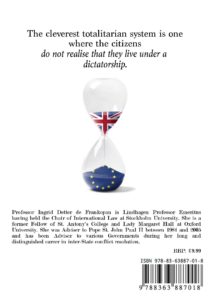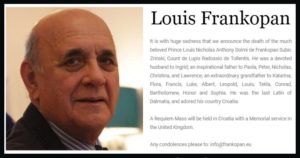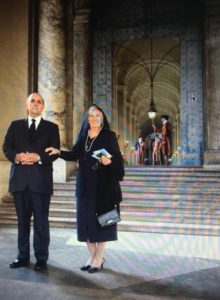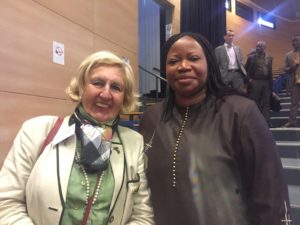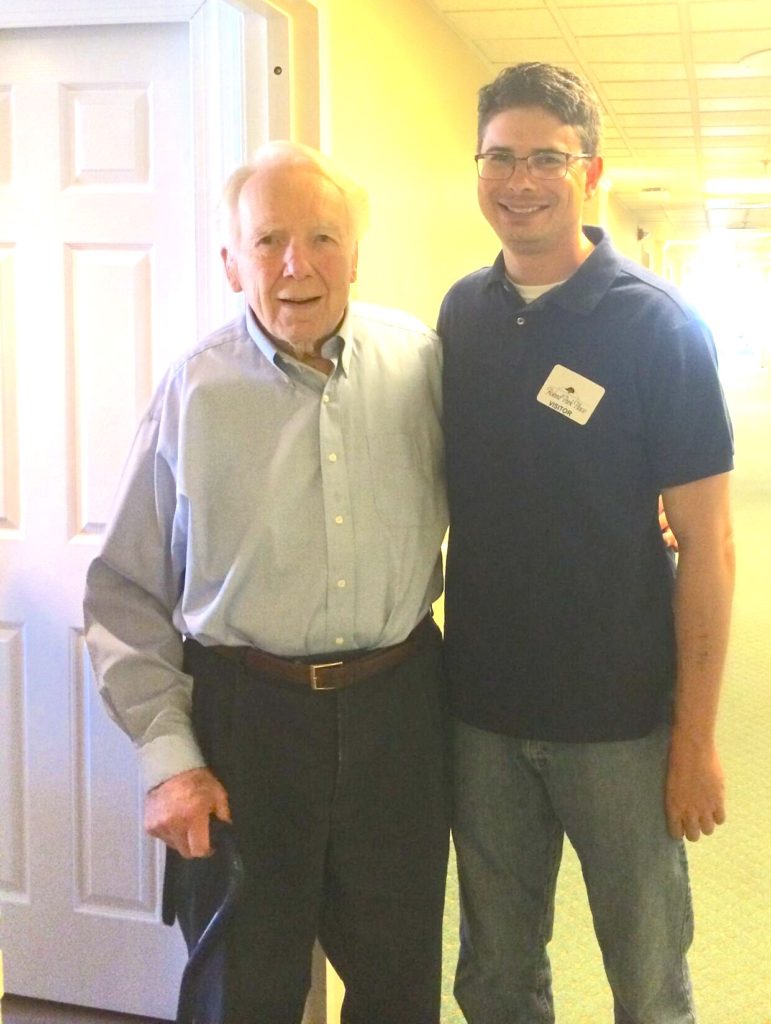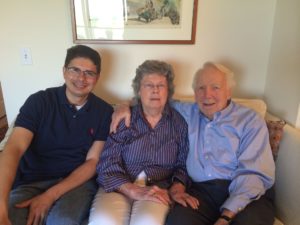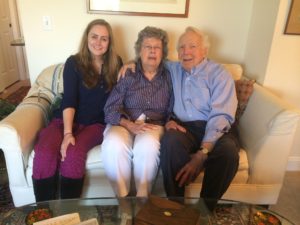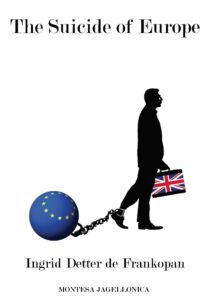RJ GAUDET & ASSOCIATES L.L.C.
"Let us realize the arc of the moral universe is long but it bends toward justice."
Dr. Martin Luther King, Jr.
Archive for the ‘International Law’ Category
Condolences to the Family of the Late Louis de Frankopan
“We are very saddened by the news of the passing of Louis de Frankopan, the husband to Prof. Dr. Ingrid Detter de Frankopan,” says Robert J. Gaudet, Jr. who is joined other members of RJ Gaudet & Associates LLC in extending their deepest sympathies to Prof. Detter and her family.
A Requiem Memorial Mass in the memory of Mr. Frankopan will be held on December 14, 2018 in the Brompton Oratory, Church of the Immaculate Heart of Mary, on Brompton Road in London, England.
Prof. Detter met Mr. Frankopan when they were students at Oxford University. It was the start of a life-long partnership and love of 50 years with numerous children and grandchildren.
Mr. Frankopan’s surviving spouse, Prof. Detter, is an accomplished Barrister and author of books on international law including the recently published “Philosophy of the Law of Nations” published by Montesa Jagellonica in 2018. She served as a legal advisor to His Holiness Pope John Paul II and represented the nation of Dominica in legal proceedings.
More recently, Prof. Detter served as an expert on international law in a federal court in California opining as to whether a terrorist act may constitute an act of war. Her husband will be greatly missed by his friends and family.
Chief Prosecutor of International Criminal Court
Years ago, Prof Dr Ingrid Detter challenged then Deputy Prosecutor of the ICC, Fatou Bensouda, that the USA would never join the ICC. The spirited dialogue was part of a panel discussion organized by Robert Gaudet Jr. at an American Bar Association SIL International Human Rights Committee event in Paris. Today, roughly 7 years later, Prof Dr Detter had an opportunityto meet now Chief Prosecutor Bensouda, both pictured below, at the yearly Conference of the Société française de droit international in Lille, France, 20 May 2017.
Britons Vote On Whether To Exit the EU, Spurred on By New Book Called “The Suicide of Europe”
On Thursday, June 23, 2016, Britons vote on whether to leave or remain in the European Union (“EU”), spurred on by a new book called “Suicide of Europe” by Prof. Dr. Ingrid Detter de Frankopan that encourages Britain to leave.
“I used to be a great fan of the European Union and the European idea but I feel I have been cheated,” said Prof. Detter in a telephone interview. As a former professor of EU law at Stockholm University and Oxford, she once tutored students on structure and framework of the European Union. Why have her views changed?
She believes the European Union is staffed by “incompetent” bureaucrats. Politicians in Brussels are “not accountable” and they’ve “taken their liberties” with their positions. “Some have gone to prison,” she explained.
“What really got me angry was that I realized that the EU organized the entire migration thing. They have these offices everywhere, and they say, ‘I’ll tell you, good man, how to get into there. Tell them you lost your passport but don’t tell them you lost your Iphone, and you’ll be fine.’” In short, according to her, the EU has contributed to the recent crisis by encouraging migration.
Because Turkey is a candidate state for membership in the EU, Prof. Detter notes that 80 million Turks could enter the EU and that they believe membership is “quite near.” Turks may have the right, as any EU citizen, to freely migrate and seek work in throughout the EU. Migration is part of what frightens British voters.
Prof. Detter has tapped into this fear with a book, “The Suicide of Europe,” that provides a rationale for emotional concerns. Her book is available through Amazon.co.uk.
Prof. Detter explained several main themes to the shortcomings of the EU: migration; lack of accountability; intrusiveness; and a fortress mentality. In the EU, “you have a handful of people on the top who decide everything.”
Prof. Detter worries that elitists in Brussels “are trying to make a United States of Europe and rub out the nation states. People don’t’ really like that. People like their roots and traditions and their history.” Others, however, may disagree. National, cultural, and linguistic divisions led to devastating wars in Europe and caused a need for greater unity, which was met by the EU’s institutions and legal framework. Since the EU’s founding, there has been unprecedented peace in Europe.
In Prof. Detter’s opinion, the lack of accountability and democracy have led to unwelcome legislation. For instance, she pointed out, “there is an EU regulation that the butter must not be next to the margarine in the shop.” The purpose of the regulation is “so people won’t take margarine by mistake or take the butter by mistake.” This regulation can pose a hardship for a small grocer, like the one in the small French village of 220 in Burgundy where Prof. Detter spends part of the year, without much refrigerated shelf space.
The shopkeeper in Verrey, France told her, “we have such little room here, I am not sure where to put the butter. We have been told we must put it away from the margarine.” Not believing such a rule could exist, Prof. Detter investigated and found that an EU regulation does require the separation of margarine from butter. It is a veritable segregation of dairy products. They must be kept separate but equal in their own refrigerated spaces.
As another example of “idiotic” regulations, Prof. Detter pointed out that “all horses in the EU have to have a passport.” She explained: “they must have a passport because, in some countries, they slaughter them and put them into the food chain and, also, they track the horses in case one of the horses was given hormones.” In essence, the EU “wants to follow the health history of every single horse.”
EU Member States pay annual dues to be a “member of this club.” “When you buy a loaf of bread, 1 percent of what you pay goes to Brussels,” Prof. Detter calculated. There is a minimum VAT of 15 percent in EU Member States that rises to as much as 25 percent in Croatia. “A slice of it goes to the EU,” Prof. Detter indicated. She implied that exiting the EU might lower VAT rates for Britons. In Switzerland, which is not in the EU, the VAT is only 8 percent, she pointed out.
The intertwined economies of EU Member States may have led to inefficient allocations. For instance, “they force people in England to buy beet root sugar from France because they are prohibited from buying sugar from Jamaica because the Jamaicans are not members of ‘the club.’” The result is a “Fortress Europe” that has “a huge wall around it.”
Although most people view the EU as a way to take down boundaries, at least among Member States, Prof. Detter has pointed out that the concept of the EU requires the strengthening of outer wall boundaries. It is a “customs union with a huge wall around it.” Putting it that way, the EU does not sound entirely different from Donald Trump’s vision for America. Some Britons apparently do want a stronger wall around their own nation, not just the EU.
“Fortress Europe” has maintained less trade with other parts of the world outside Europe, Prof. Detter argued. Thirty to forty years ago, she says, Africa was 25 percent of trade but, now, it is down to 5 percent “after the EU started a wall around it.” “The EU is starving the developing world through decreased trade but nobody talks about that.” The EU is making contributions to the developing world but, by Prof. Detter’s calculations, “that is negligible compared to what they destroyed.”
“I’m very angry,” admitted Prof. Detter. “The more I investigated this, the more angry I got.”
Millions of Britons feel the same way, although they might not have the statistics, history, or law as readily at their disposal as Prof. Detter.
As for the lack of transparency, Prof. Detter heard about the Transatlantic Trade and Investment Partnership and tried to find a copy of the text so that she, as an international lawyer, could read it for herself. It was not available. She checked the EU website but it had “a little note attached to the treaty saying this does not include all of the amendments.” She could not find the full text and was alarmed that it “was negotiated in total, total secrecy.”
“It all becomes very suspicious what they are up to if you cannot find a whole text,” she said. Making a reference to President Woodrow Wilson, she remarked, “like Wilson said, we want open treaties, openly arrived at. That was one of his points in 1919.” Of course, everyone knows how President Wilson’s treaty to end WWI fared. The next devastation, WWII, was unfortunately soon to follow.
The lack of sufficient democracy is a long-standing criticism of the EU, often written about in academic literature. Prof. Dr. Detter is not alone with her criticisms, but she is very timely with the release of her new book over the past four weeks, just coinciding with the British vote.
In the past, the EU responded to criticisms about the democracy deficit with reforms that gave the European Parliament more power over legislation and that gave citizens an opportunity to raise issues with the European Commission through a popular petition. However, as Prof. Dr. Detter’s criticisms indicate, these reforms were apparently not enough to appease a majority British voters. Half of them now indicate they’d prefer to leave the European Union.
Ironically, the British debate intertwines with the American debate over whether to build a larger wall with Mexico or exclude Muslims from entering the United States, views expressed by Trump that Democrats and many Republicans have criticized.
For Europeans, migration raises an existential question of who are we but it also raises a practical question of how many migrants, and from where, shall they accept? Prof. Detter points out the EU concluded an association agreement with the Ukraine to allow 43 million Ukrainians to enter and travel without visas throughout Europe. The measure was ratified by all of the EU member states except the Netherlands, and 450,000 Dutch protested against it.
The Dutch government held a referendum and the majority rejected the measure. Rather than accept this popular rejection, the EU said the Dutch had to hold another referendum. Prof. Detter lists this as an example of how “they force things on the Member States like they did in Ireland” and this is part of the “democratic deficit.” The disconnect between Brussels and national sentiments is part of what motivated Prof. Detter to write her book, “The Suicide of Europe.” “They can’t get away with this sort of thing,” she thought, and she strove to “finish” a book that had been on her mind for years.
The vote on June 23 will be historic, whether it results in Britain’s exit (“Brexit”) from the EU or not. Either way, it is a period of soul-searching, deep thinking, and questions about the best way forward. Prof. Dr. Detter’s book is a pointed but useful contribution to the public debate. It is not clear whether the real “suicide” of Europe would result from the continuation of the EU or its weakening through the departure of one of its major contributor nations.
Prof. Detter is an English barrister and Of Counsel to American law firm RJ Gaudet & Associates LLC which handles international law, human rights, civil rights, class actions, and other matters. The views of Prof. Detter do not necessarily reflect those of the law firm.
